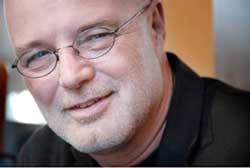An Interview with Brian McLaren
 On a recent Friday night at Montview Presbyterian Church in Denver, CO, I joined a sanctuary full of progressive mainline Protestants and a smattering of young evangelicals, Catholics and agnostics to listen to a lecture by "one of America's 25 most influential evangelicals" (Time Magazine). Brian McLaren, one of the leading voices of the Emergent Church movement, was in town promoting his latest book, A New Kind of Christianity: Ten Questions that Are Transforming the Faith and clearly winning fans across theological divides with his honest probing and unconventional discussion of the central questions of our faith. Challenging the traditional assumptions around core Christian beliefs and advocating a dynamic discipleship that is more about the questions than the answers, this evangelical pastor-turned-author is preaching a compelling message for the future of Christianity that is building bridges across religious divides within the Church and beyond.
On a recent Friday night at Montview Presbyterian Church in Denver, CO, I joined a sanctuary full of progressive mainline Protestants and a smattering of young evangelicals, Catholics and agnostics to listen to a lecture by "one of America's 25 most influential evangelicals" (Time Magazine). Brian McLaren, one of the leading voices of the Emergent Church movement, was in town promoting his latest book, A New Kind of Christianity: Ten Questions that Are Transforming the Faith and clearly winning fans across theological divides with his honest probing and unconventional discussion of the central questions of our faith. Challenging the traditional assumptions around core Christian beliefs and advocating a dynamic discipleship that is more about the questions than the answers, this evangelical pastor-turned-author is preaching a compelling message for the future of Christianity that is building bridges across religious divides within the Church and beyond.
I spoke with McLaren recently about his "new kind of Christianity" and the exciting convergence of thought it represents, as well as what mainliners and evangelicals can learn from each other, the importance of inter-religious dialogue, his evangelical critics, the spiritual practices that keep him grounded, and signs of hope in the mainline church.
You self-identify as an evangelical, yet pack church halls and auditoriums with mainline Protestants, Catholics, agnostics, and seekers. Why do you attract such a diverse audience? What is it in your message that seems to resonate with so many?
My background is evangelical, but I believe there is a powerful convergence happening -- what I would call progressive evangelicals (or post-evangelicals) coming together with post-liberal mainliners and progressive (or Vatican II) Catholics. And many of the "spiritual but not religious" are finding hope and support in this convergence as well. I hope my work can foster this convergence, because I believe our future together can be so much more rich and vigorous than our divided past has been.
Your earlier book, A New Kind of Christian, was an exploration of your faith journey and the personal questions you were struggling with. Your new book seems more directed to the Church, with a compelling list of ten questions facing today's communities of faith. What prompted this shift from the individual to the corporate question?
In my travels, I've realized more and more that monumental questions are being raised by two groups of people I care about a great deal. First there are people outside the church who are trying to get in -- not into organized religion, per se, but into a truly spiritual life and an authentic community of faith. But these questions are obstructing their path. Then there are people inside the church who are on their way out unless they get answers to these questions. These questions are so much deeper than the church-pragmatics we normally talk about -- styles of music, styles of preaching, styles of leadership, and so on. So it became clear to me that I might be able to help by articulating these questions and encouraging folks to address them openly and, I hope, charitably and intelligently as well.
You talk about questions being more important than beliefs in your new book. Why do you say that? What does faith mean to you?
If my beliefs are static, then in a sense I will never apprehend more of the truth than I do now. But if my beliefs are continually challenged by questions, then my religion can be more than a list of static beliefs: it can be a life of faith, a life of discovery and exploration. This idea of ongoing, lifelong growth is inherent in the word "disciple"; as I understand it, a disciple isn't a know-it-all -- he or she is a learner. And questions fuel the blessed unrest that keeps us learning, growing, moving forward.
One of the most radical propositions in your new book is the shift in our starting point for approaching the Bible. You challenge the traditional narrative lens -- the "Story" of the Bible as being primarily the Garden of Eden, the Fall, Salvation, and Heaven or Hell -- as not only be misguided, but as much too small of a story for what the Bible really offers. What are we missing by reading the Bible with the first narrative lens?





